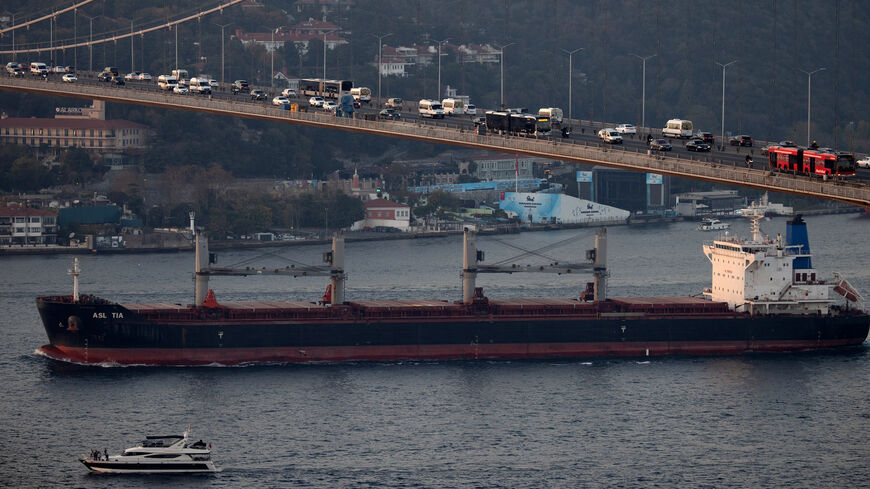ANKARA — A Russian delegation stationed in Turkey since July 2022 for implementation of the Black Sea grain deal has left the country, the Turkish Defense Ministry announced on Thursday, spelling the de facto end of the sole mechanism that brought Ukrainian and Russian officials to work together on a regular basis.
Turkey’s announcement came after Russia’s withdrawal from the critical deal earlier this week amid international warnings of a looming global food crisis and potential hunger in the world's impoverished communities. The delegation, based in Istanbul since July 2022, included Russian inspectors and military officials whose responsibilities included inspecting Ukrainian ships passing through the Turkish straits to and from Ukraine. The Turkish Defense Ministry didn't clarify when the delegation would return, if at all.
The Defense Ministry said Turkey would keep the joint center operational, adding that there was still hope for Russia's return to the deal. The center was set up to facilitate the implementation of the mechanism. The deal, which was struck in July 2022, expired on Monday after Russia refused to extend it. Global grain prices spiked by nearly 5% since Moscow's announcement of its withdrawal.
The Black Sea grain mechanism allowed Ukrainian foodstuff, most importantly its grain, to reach world markets. According to the UN World Food Program (WFP), more than 35 countries across the world have imported grain from Ukraine — dubbed the world's breadbasket.
The Turkish Defense Ministry said on Thursday that nearly 33 million tonnes of grain were exported under the deal since last July after the Russian invasion of Ukraine halted exports from the war-torn country.
The WFP is among the leading buyers of Ukrainian grain as part of its food-assistance program for impoverished communities across the world, particularly in Africa. WFP-chartered vessels have transported more than 655,000 tonnes to Ethiopia, Yemen, Afghanistan, Sudan, Somalia and Kenya, according to the institution’s figures.
The international body earlier this month stressed that the deal was critical, particularly for nations facing food insecurity. “Continuing food exports from Ukraine remains of utmost importance to WFP as grain represents most of the traditional food basket globally; without it, severe challenges are expected to supply affordable grain to communities in countries facing acute food insecurity,” a WFP report released on July 7 said.
The Turkish Defense Ministry on Thursday also stressed the “vital role” the deal plays in efforts to thwart a global food crisis, adding that Ankara’s contacts with the United Nations as well as with Kyiv and Moscow to resume the Black Sea Grain Deal Initiative are ongoing.
The deal was extended three times since its initiation in July of last year, but the Kremlin refused to extend the deal for another three-month term until a set of demands it tabled are met.
The Russian side cites the blocking of Russian banks from making and receiving international payments using the SWIFT system, and insurance-related sanctions as effectively obstructing Russian food and fertilizer exports from reaching world markets, despite an agreement Moscow signed with the UN and Turkey under the initiative.
Western capitals, in turn, maintain that the sanctions aren’t targeting products that remain under the Black Sea grain deal’s scope.
Ukrainian President Volodymyr Zelenskyy earlier this week offered to use an alternate route in the Black Sea for shipments, but Moscow on Wednesday designated northwest and southeast of the Black Sea as “temporarily dangerous” for shipping.
Following the announcement, Russia struck several Ukrainian ports on the Black Sea coast overnight on Thursday, destroying tens of thousands of tonnes of grain, Ukrainian officials said.
The White House also warned Wednesday that Russia might be gearing up for an attack on civilian ships. “Our information indicates that Russia laid additional sea mines in the approaches to Ukrainian ports,” White House National Security Council spokesman Adam Hodge was quoted as saying by The Associated Press. “We believe that this is a coordinated effort to justify any attacks against civilian ships in the Black Sea and lay blame on Ukraine for these attacks.”
Possible backlash
The Black Sea mechanism was hailed by the international community after its inception, earning Turkey rare praise from its Western allies. UN Secretary-General Antonio Guterres described it as “a beacon of hope.” It has also served as the sole platform where Ukrainian and Russian officials directly worked together along with UN and Turkish officials.
“I think Russia is sending a clear signal that it is less willing to work through the UN to make compromises with the West,” Richard Gowan, UN director for the International Crisis Group, told Al-Monitor.
“The Russians may still hope that they can pressure the West into offering concessions to resurrect the deal. UN officials would like to find some sort of compromise, but I am not sure that a new deal will be possible,” he added.
However, the Russian decision could face a backlash, particularly from Arab and African nations that rely on food imports, Gowan warned.
“It looks like Russia is willing to hurt its credibility in the Global South to do short-term damage to Ukraine and the Western powers,” he said.








